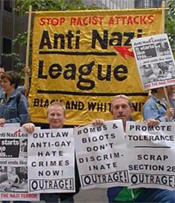 |


|
|
Guilty of Murder Azerbaijan Legalizes Gay Male Sex ILGA to Meet in Homophobic Romania |
|
By Rex Wockner International News Report Nazi Sympathizer Pub Bomber Guilty of Murder
 The Nazi sympathizer who bombed London's Admiral Duncan gay pub
in April 1999 received six life prison sentences June 30.
The Nazi sympathizer who bombed London's Admiral Duncan gay pub
in April 1999 received six life prison sentences June 30.
The attack by David Copeland, 24, killed three people and injured 86. In sentencing Copeland, Judge Michael Hyam said: "Anyone who has heard the facts of this case will be appalled and horrified at the atrocity of your crimes. ... The public must be protected from you and assured that if you are ever released it will not be for a very long time." Copeland received one life sentence for each murder, one for the bombing itself, and one each for two other bombings that targeted blacks and Bangladeshis. He told the court: "I believe in what I believed in and I took that belief to the extreme. If no one remembers who you were, then you never existed. My aim was political. It was to cause a racial war in this country." Azerbaijan Legalizes Gay Male Sex
In the whole of Europe only the former Soviet republic of Armenia, the Bosnian Serb Republika Srpska and Russia's Chechen Republic still ban gay sex outright, according to the International Lesbian & Gay Association. The Council of Europe was founded following World War II and works to strengthen democracy, human rights and the rule of law in member states. The European Convention on Human Rights is the most important of its many human-rights treaties. Violations of the convention are settled by the European Court of Human Rights. The Council is governed by the foreign ministers of its member states (the Committee of Ministers) and by representatives from national parliaments (the Parliamentary Assembly). For more information, visit www.coe.fr. ILGA to Meet in Homophobic Romania The 22nd European regional conference of the International Lesbian & Gay Association will be in homophobic Romania this year from Oct. 4 to 8. "Homosexuality is still incriminated [sic] by Article 200 from the Penal Code," said organizer Adrian Coman of the Bucharest gay group Accept. "[The conference] will add needed moral support to the Romanian lesbian and gay community that is still facing not only discrimination by law but also homophobia and sometimes institutionalized propaganda." The conference will coincide with the presidential campaign and with Romania's ongoing efforts to bring its human-rights standards in line with requirements for membership in the European Union. On June 28, the lower house of parliament, the Chamber of Deputies, voted to legalize gay sex except when "performed in public." The measure has not been considered by the Senate. Current law states: "Same-sex relations taking place in public or resulting in a public scandal shall be punished by one to five years imprisonment. Enticing or seducing a person to practice same-sex relations as well as propaganda, association or other forms of proselytizing with the same aim shall be punished by one to five years imprisonment." To register for the ILGA meeting, write Accept, P.O. Box 34-56, Bucharest, Romania; phone 011-40-1-252-1637; fax 011-40-1-252- 5620; e-mail accept@fx.ro or visit http://accept.ong.ro/Conference2000.html. The European Union is composed of 15 western European nations working toward unification. It was formed in 1956. EU law is made by the Council of Ministers which receives instructions from the European Council which is composed of the heads of state of EU member nations. The EU's supreme court is the European Court of Justice in Luxembourg. |
